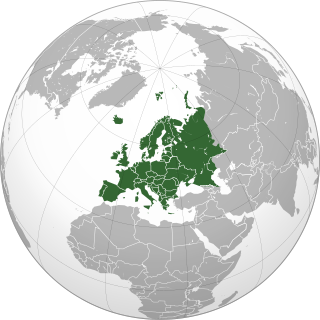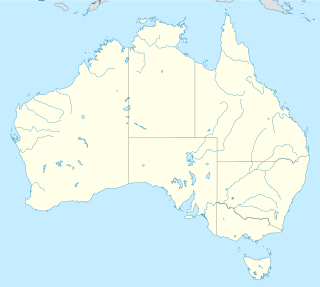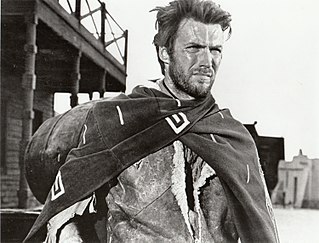
The Balkans, also known as the Balkan Peninsula, are a geographic area in southeastern Europe with various definitions and meanings, including geopolitical and historical. The region takes its name from the Balkan Mountains that stretch throughout the whole of Bulgaria from the Serbian–Bulgarian border to the Black Sea coast. The Balkan Peninsula is bordered by the Adriatic Sea in the northwest, the Ionian Sea in the southwest, the Aegean Sea in the south, the Turkish Straits in the east, and the Black Sea in the northeast. The northern border of the peninsula is variously defined. The highest point of the Balkans is Mount Musala, 2,925 metres (9,596 ft), in the Rila mountain range, Bulgaria.

Cleveland, officially the City of Cleveland, is a major city in the U.S. state of Ohio, and the county seat of Cuyahoga County. It is located on the southern shore of Lake Erie, across the U.S. maritime border with Canada and approximately 60 miles west of the Ohio-Pennsylvania state border.

Europe is a continent located entirely in the Northern Hemisphere and mostly in the Eastern Hemisphere. It comprises the westernmost part of Eurasia and is bordered by the Arctic Ocean to the north, the Atlantic Ocean to the west, the Mediterranean Sea to the south, and Asia to the east. Europe is commonly considered to be separated from Asia by the watershed of the Ural Mountains, the Ural River, the Caspian Sea, the Greater Caucasus, the Black Sea, and the waterways of the Turkish Straits. Although some of this border is over land, Europe is generally accorded the status of a full continent because of its great physical size and the weight of history and tradition.

In the history of Europe, the Middle Ages or Medieval Period lasted from the 5th to the late 15th century. It began with the fall of the Western Roman Empire and merged into the Renaissance and the Age of Discovery. The Middle Ages is the middle period of the three traditional divisions of Western history: classical antiquity, the medieval period, and the modern period. The medieval period is itself subdivided into the Early, High, and Late Middle Ages.

Perth is the capital and largest city of the Australian state of Western Australia (WA). It is Australia's fourth-most populous city, with a population of 2.14 million living in Greater Perth. Perth is part of the South West Land Division of Western Australia, with most of the metropolitan area on the Swan Coastal Plain between the Indian Ocean and the Darling Scarp. The city has expanded outward from the original settlements on the Swan River, upon which the city's central business district and port of Fremantle are situated.

The Spaghetti Western, also known as Italian Western or Macaroni Western, is a broad subgenre of Western films that emerged in the mid-1960s in the wake of Sergio Leone's film-making style and international box-office success. The term was used by American critics and those in other countries because most of these Westerns were produced and directed by Italians.

Western Sahara is a disputed territory on the northwest coast and in the Maghreb region of North and West Africa. About 20% of the territory is controlled by the self-proclaimed Sahrawi Arab Democratic Republic, while the remaining 80% of the territory is occupied and administered by neighboring Morocco. Its surface area amounts to 266,000 square kilometres (103,000 sq mi). It is one of the most sparsely populated territories in the world, mainly consisting of desert flatlands. The population is estimated at just over 500,000, of which nearly 40% live in Laayoune, the largest city in Western Sahara.

Western Australia is a state occupying the western 32.9 percent of the land area of Australia excluding external territories. It is bounded by the Indian Ocean to the north and west, and the Southern Ocean to the south, the Northern Territory to the north-east, and South Australia to the south-east. Western Australia is Australia's largest state, with a total land area of 2,527,013 square kilometres (975,685 sq mi), and the second-largest country subdivision in the world, surpassed only by Russia's Sakha Republic. As of 2017, the state has about 2.6 million inhabitants – around 11 percent of the national total – of whom the vast majority live in the south-west corner, 79 percent of the population living in the Perth area, leaving the remainder of the state sparsely populated.

Western Europe is the region comprising the western part of Europe. Though the term Western Europe is commonly used, there is no consensus on which countries comprise it.

Western is a genre of fiction set primarily in the latter half of the 19th century in the Western United States, which is styled the "Old West". Its stories commonly center on the life of a nomadic cowboy or gunfighter armed with a revolver and a rifle who rides a horse. Cowboys and gunslingers typically wear Stetson hats, neckerchief bandannas, vests, spurs, cowboy boots, and buckskins. Recurring characters include the aforementioned cowboys, Native Americans, Spaniards, Mexicans, bandits, lawmen, bounty hunters, outlaws, gamblers, soldiers, and settlers. The ambience is usually punctuated with a Western music score, including American and Spanish/Mexican folk music such as country, Native American music, New Mexico music, and rancheras.

The Western Hemisphere is a geographical term for the half of Earth which lies west of the prime meridian and east of the antimeridian. The other half is called the Eastern Hemisphere. It may be used in a cultural or geopolitical sense as a synonym for the "New World".

The University of Western Ontario (UWO), corporately branded as Western University as of 2012 and commonly shortened to Western, is a public research university in London, Ontario, Canada. The main campus is located on 455 hectares of land, surrounded by residential neighbourhoods and the Thames River bisecting the campus's eastern portion. The university operates twelve academic faculties and schools. It is a member of the U15, a group of research-intensive universities in Canada.

The Western United States is the region comprising the westernmost states of the United States. As American settlement in the U.S. expanded westward, the meaning of the term the West changed. Before about 1800, the crest of the Appalachian Mountains was seen as the western frontier. The frontier moved westward and eventually the lands west of the Mississippi River were considered the West.

The Western Ghats, also known as Sahyadri, is a mountain range that covers an area of 140,000 square kilometres (54,000 sq mi) in a stretch of 1,600 kilometres (990 mi) parallel to the western coast of the Indian peninsula, traversing the states of Tamil Nadu, Kerala, Karnataka, Goa, Maharashtra and Gujarat. It is a UNESCO World Heritage Site and is one of the eight hot-spots of biological diversity in the world. It is sometimes called the Great Escarpment of India. It contains a very large proportion of the country's flora and fauna, many of which are only found in India and nowhere else in the world. According to UNESCO, the Western Ghats are older than the Himalayas. They influence Indian monsoon weather patterns by intercepting the rain-laden monsoon winds that sweep in from the south-west during late summer. The range runs north to south along the western edge of the Deccan Plateau, and separates the plateau from a narrow coastal plain, called Konkan, along the Arabian Sea. A total of thirty-nine areas in the Western Ghats, including national parks, wildlife sanctuaries and reserve forests, were designated as world heritage sites in 2012 – twenty in Kerala, ten in Karnataka, six in Tamil Nadu and four in Maharashtra.

Western Asia—or simply West Asia—is the westernmost subregion of Asia. It includes Anatolia, the Arabian Peninsula, Iran, Mesopotamia, the Levant region, the island of Cyprus, the Sinai Peninsula, and Transcaucasia (partly). The region is considered to be separated from Africa by the Isthmus of Suez in Egypt, and separated from Europe by the waterways of the Turkish Straits and the watershed of the Greater Caucasus. Central Asia lies to its northeast, while South Asia lies to its east. Eight seas surround the region (clockwise): the Aegean Sea, the Black Sea, the Caspian Sea, the Persian Gulf, the Arabian Sea, the Gulf of Aden, the Red Sea, and the Mediterranean Sea.

Western esotericism, also known as esotericism, esoterism, and sometimes the Western mystery tradition, is a term under which scholars have categorised a wide range of loosely related ideas and movements which have developed within Western society. These ideas and currents are united by the fact that they are largely distinct both from orthodox Judeo-Christian religion and from Enlightenment rationalism. Esotericism has pervaded various forms of Western philosophy, religion, pseudoscience, art, literature, and music, continuing to affect intellectual ideas and popular culture.

The Western Roman Empire comprises the western provinces of the Roman Empire at any time during which they were administered by a separate independent Imperial court; in particular, this term is used in historiography to describe the period from 395 to 476, where there were separate coequal courts dividing the governance of the empire in the Western and the Eastern provinces, with a distinct imperial succession in the separate courts. The terms Western Roman Empire and Eastern Roman Empire were coined in modern times to describe political entities that were de facto independent; contemporary Romans did not consider the Empire to have been split into two separate empires but viewed it as a single polity governed by two separate imperial courts as an administrative expediency. The Western Roman Empire collapsed in 476, and the Western imperial court in Ravenna was formally dissolved by Justinian in 554. The Eastern imperial court survived until 1453.

The Pacific Time Zone (PT) is a time zone encompassing parts of western Canada, the western United States, and western Mexico. Places in this zone observe standard time by subtracting eight hours from Coordinated Universal Time (UTC−08:00). During daylight saving time, a time offset of UTC−07:00 is used.

The Western world, also known as the West, refers to various regions, nations and states, depending on the context, most often consisting of the majority of Europe, Australasia, and the Americas. The Western world is also known as the Occident, in contrast to the Orient, or Eastern world. It might mean the Northern half of the North–South divide. Western culture is commonly said to include: Australia, Canada, all European member countries of the EFTA and EU, the European microstates, New Zealand, the United Kingdom, and the United States.

Western culture, sometimes equated with Western civilization, Occidental culture, the Western world, Western society, and European civilization, is the heritage of social norms, ethical values, traditional customs, belief systems, political systems, artifacts and technologies that originated in or are associated with Europe. The term also applies beyond Europe to countries and cultures whose histories are strongly connected to Europe by immigration, colonization, or influence. For example, Western culture includes countries in the Americas, such as Canada or the United States, and Oceania, such as Australia or New Zealand, whose language and demographic ethnicity majorities are of European descent without indigenous influence. Western culture is most strongly influenced by the Greco-Roman and Christian cultures.






















